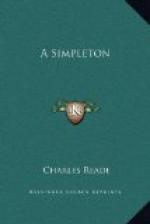Christopher was too generous to tell him this; but he acted on it, and said he thought his was an excellent proposal; indeed, he had better take all the diamonds they had got to Dale’s Kloof first, and show them to his wife, for her consolation: “And perhaps,” said he, “in a matter of this importance, she will go to Cape Town with you, and try the market there.”
“All right,” said Falcon.
He sat and brooded over the matter a long time, and said, “Why make two bites of a cherry? They will only give us half the value at Cape Town; why not go by the steamer to England, before the London market is glutted, and all the world finds out that diamonds are as common as dirt?”
“Go to England! What! without your wife? I’ll never be a party to that. Me part man and wife! If you knew my own story”—
“Why, who wants you?” said Reginald. “You don’t understand. Phoebe is dying to visit England again; but she has got no excuse. If you like to give her one, she will be much obliged to you, I can tell you.”
“Oh, that is a very different matter. If Mrs. Falcon can leave her farm—”
“Oh, that brute of a brother of hers is a very honest fellow, for that matter. She can trust the farm to him. Besides, it is only a month’s voyage by the mail steamer.”
This suggestion of Falcon’s set Christopher’s heart bounding, and his eyes glistening. But he restrained himself, and said, “This takes me by surprise; let me smoke a pipe over it.”
He not only did that, but he lay awake all night.
The fact is that for some time past, Christopher had felt sharp twinges of conscience, and deep misgivings as to the course he had pursued in leaving his wife a single day in the dark. Complete convalescence had cleared his moral sentiments, and perhaps, after all, the discovery of the diamonds had co-operated; since now the insurance money was no longer necessary to keep his wife from starving.
“Ah!” said he; “faith is a great quality; and how I have lacked it!”
To do him justice, he knew his wife’s excitable nature, and was not without fears of some disaster, should the news be communicated to her unskilfully.
But this proposal of Falcon’s made the way clearer. Mrs. Falcon, though not a lady, had all a lady’s delicacy, and all a woman’s tact and tenderness. He knew no one in the world more fit to be trusted with the delicate task of breaking to his Rosa that the grave, for once, was baffled, and her husband lived. He now became quite anxious for Falcon’s departure, and ardently hoped that worthy had not deceived himself as to Mrs. Falcon’s desire to visit England.
In short, it was settled that Falcon should start for Dale’s Kloof, taking with him the diamonds, believed to be worth altogether three thousand pounds at Cape Town, and nearly as much again in England, and a long letter to Mrs. Falcon, in which Staines revealed his true story, told her where to find his wife, or hear of her, viz., at Kent Villa, Gravesend, and sketched an outline of instructions as to the way, and cunning degrees, by which the joyful news should be broken to her. With this he sent a long letter to be given to Rosa herself, but not till she should know all: and in this letter he enclosed the ruby ring she had given him. That ring had never left his finger, by sea or land, in sickness or health.




